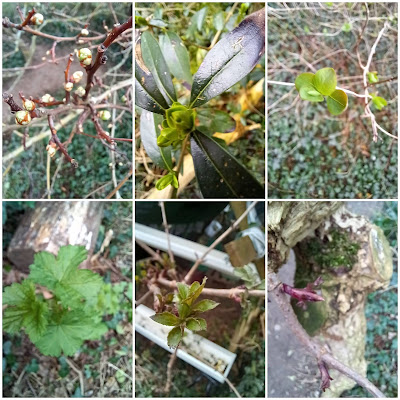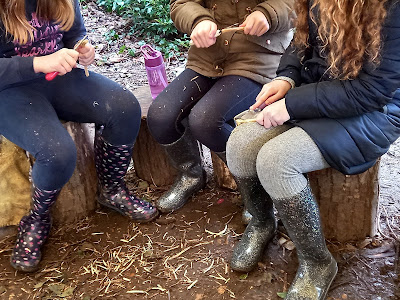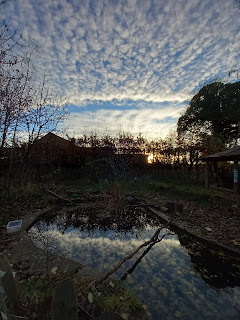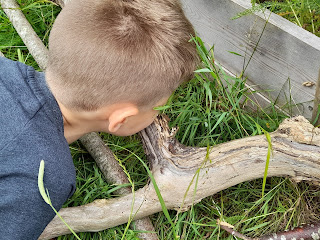Learning Opportunities
Tomorrow is the Spring Equinox. Whatever the weather is throwing at the UK at the moment we are hurtling towards April and Winter has passed. There is so much to do and so little time in which to get anything done! Blowing gales and 'unauthorised visitors' leave a wake across school grounds, the outdoor environment needs maintaining to ensure that previous hard work and development isn't lost, and the evolvement of the site needs planning.
Frequently the curriculum is at odds with the yearly cycle of the planet, with science lessons about 'growing' planned for Autumn terms. This may simply need a review of the timetable for teaching science but is a change in the way things have been done in the past, and revamping a Science scheme of work to fit in with year groups, facilities AND seasons is a specific job!
All of this is planned yet none of it is planned! Questions arise and information is available. The children lead the learning and move it on to places that could never be anticipated!
Wet, miserable weather will be considered reason enough to cancel rather than adapt planned lessons outside - even though this is Britain at its rainy norm!
Of course, not every school playground has trees, or grass, or access to much you could call 'natural', but it can be brought in, it can be developed and it can be visited. We are lucky at Chartham and appreciate every acre we have. The care and maintenance of it can be demanding, the ongoing changes and introduction of new areas and ways to use the space takes time, and currently getting classes outside takes priority, but we think it is worth the effort.
Seasons change and bring new challenges to the outdoor area, these are set in nature and a learning resource to be harvested. It's something Forest School has no choice but to use, our 'classroom' is deciduous, we are open to the elements, we have to work with the rain or the snow and alter our activities to either accommodate or to celebrate the differences. Finding an ants nest is a learning opportunity, the discovery of an eggshell beneath a tree is a learning opportunity, watching a pheasant strut out of the bushes is a learning opportunity. None of which can be planned in advance.
There are obvious clues for learning. Winter is likely to include ice and snow, Spring will bring buds and birdsong, Summer has bees and butterflies, wide skies and shadows, Autumn has colour and harvests... You can hedge your bets and be ready for the possibility of events to take advantage of, but they can't be assigned a week or day within a term to focus on! However, across a year, you can be sure you will have an opportunity to explore and investigate all of these things. This is the best way for outdoor learning to inform and extend knowledge.
It is 'easy' to do within Forest School, but tougher for teachers to utilise. It is both a mindset and skillset not fostered during teacher training, and very difficult to interlace with the demands of evidence and data.
Frequently the curriculum is at odds with the yearly cycle of the planet, with science lessons about 'growing' planned for Autumn terms. This may simply need a review of the timetable for teaching science but is a change in the way things have been done in the past, and revamping a Science scheme of work to fit in with year groups, facilities AND seasons is a specific job!
There's an omission of local flora and fauna also, with Rainforest topics rarely including the Scottish Highlands, or extinction themes focusing on snow leopards and rhinos and not bees and hedgehogs! It's not that Global issues are not important, but including local alongside makes the possibility of real action becomes feasible.
This week we've investigated birds eggs, and nests, and feathers, we've examined a bumblebee close up, and we've discovered beetle larvae. We've looked at shapes in vines and roots, we've worked twigs and twine to create sculptures by using tools, and we've looked at the effect of the wind on the tiny trees we're helping to grow. We worked with the rain, catching it and using it in the mud kitchen to create different textures. We worked out which way the wind was blowing. We used tools and discussed safety.
Throughout Primary Education it slowly erodes. I have worked in schools where the bemoaning of children's struggle to be independent learners grows in direct correlation to the decline in this educational approach. As lessons became more desk-based and book/whiteboard led the more the children awaited the correct answers and lost the incentive to work them out for themselves.
Moving lessons outside (within the English Education system) will need to be sanctioned by School Leadership Teams, how to integrate it into weekly/daily school life will need support, and communication with staff confident to teach outside will be essential. It will always feel like an optional extra unless led by management.
Then we have the old argument 'I/they will be ill if we go outside in the cold', which despite the Covid pandemic is still taken as fact when the reverse is true - going outdoors actually keeps us safe from germs!
It's true that dull, dank, February is not the most alluring time to take a class outdoors, but using nature to enhance all aspects of education has way more benefits than disadvantages!
Currently engaged in her PhD on the Impact of Nature on Children's Development and Wellbeing, Gemma Goldenberg started the Instagram account PhD and Three to share the amount of information she was discovering.
On trees alone she summarised:
Forest School is a highly useful asset, yet not by any means the sole provider of outdoor learning. I've said many times that taking a lesson outside, simply with clipboards, has a positive effect. Looking and listening to the world beyond the front door provides experiences to add to a story. STEM adapts well to the outdoors, and Nature's classroom provides resources and opportunities teaching staff would struggle to collate. Everything can be messier and on a much bigger scale with the SPACE it affords a project!
Bringing the outside in helps Nature Connectedness. In fact, being amongst Nature doesn't automatically mean a connection to it. That kind of understanding can be fostered inside before heading out into the great outdoors. A great way to link learning in class with a follow-up activity outside - or an activity outdoors that can link to learning afterwards in class.
Spring and Summer are the perfect time to start.
Life after lockdown is the perfect time to start.
lt can only encourage children to be happier, healthier, and better learners.


















Comments
Post a Comment